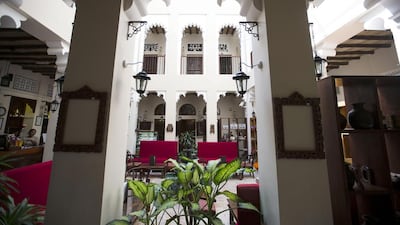Sand-coloured coral walls, wooden ceiling beams and non-existent parking all seems a far cry from the UAE’s ultra glitzy hotel scene.
But such idiosyncrasies are among some of the features that endear Dubai’s heritage hotels in its old trading areas.
The Dubai-based Planet Group's Arabian Courtyard Hotel and Spa manages three old residences converted into hotels and guesthouses that date back to early 1900s. Another, the XVA Art Hotel, is managed independently in Dubai's old Bastakiya district by Mona Hauser.
“Since we had the first experience with Orient Guest House, we realised these rooms are hard to sell to the local market, where hotels mean fitness rooms and swimming pools,” says Habib Khan, the general manager of Arabian Courtyard Hotel and Spa.
“So, we launched the first property in [ITB travel show in Berlin in] 2007. And we got a very positive response from people who were selling other destinations such as Lebanon and Egypt because Dubai didn’t have similar products.”
The buildings – all now owned by Dubai’s Heritage Department – usually date back decades, some up to 100 years.
The XVA Art Hotel, which Ms Hauser has been managing since 2003, has four interlinked houses, featuring a 13-room guesthouse, a cafe and an art gallery.
The Orient Guest House, which was the first to be converted into a guesthouse in 2006 by Arabian Courtyard Hotel and Spa, is also located in Bastakiya.
The neighbourhood once housed Iranian migrants, who named it after an Iranian town called Bastak, according to the journalist Jim Krane in his 2009 book Dubai: The Story of the World's Fastest City.
The Orient Guest House property is referred to as “villas 91A and 92” in Dubai Municipality papers, and features 11 rooms.
A similar property, Ahmedia Heritage Guest House, located in Al Ras near Shindaga tunnel across the creek from Bur Dubai, was converted into a guest house in 2011 and the second unit came online last year.
Barjeel Heritage Guest House is the most recent property to be added to the heritage hotels list late last year. It comes with nine rooms around a courtyard and an Emirati restaurant overlooking the creek in the Shindaga area in Bur Dubai.
Of the three, Ahmedia Heritage Guest House is considered the oldest, being part of the same complex as the Ahmadiya School, which was established in 1912.
Past the narrow streets of Al Ras, it was once a residence of Al Hamili family and, similar to the other three properties, the rooms are arranged around a small open space after the main door, much like a square courtyard.
The glass ceiling, which seals off the roof to enable the property to be air-conditioned, is among the more visible efforts to make the old houses fit for modern living.
The Ahmadiya Art Gallery near the lobby stands at where a majlis used to be. Bedrooms line the upper floor of the two-storey house.
While Dubai Municipality’s Heritage Department is in charge of renovating the buildings and regular maintenance, the daily up-keep of these structures falls with Mr Khan.
“We maintain the building but have guidelines from the Heritage Department,” he says. “For instance, we cannot paint over the walls. And there are a lot of electrical and plumbing issues as these tend to get busted with age.”
While that makes it difficult to explain to visitors challenges such as keeping out the moisture from the nearby creek out of the old walls, Mr Khan appreciates the role such establishments can play in boosting awareness of the Emirates and its culture.
“This is a great way to promote Dubai as a destination,” he says.
“Moreover, the sense of togetherness that held a family is evident in how a house here grew, such as adding a room when a son got married. This is what heritage and cultural values are about. ”
Ms Hauser agrees. “To me it’s about art.”
Given the success of the heritage hotel concept, Dubai Municipality aims to develop it further.
“We plan to have three to four more heritage guest houses in Dubai in the next couple of years,” says Ebtihal Mohammed Almadani, the principal interior architect at the Architectural Heritage Department in Dubai Municipality.
But that depends on whether the old structures have space to accommodate modern amenities, such as a bathroom.
The Arabian Courtyard Hotel and Spa has invested about Dh6 million until now to maintain its three properties.
That includes things such as the handmade wood furniture and detailing such as chunky, old iron locks for doors and lantern-shaped lamps in the corridors.
The group’s guest houses have an average occupancy of about 75 per cent and an average room rate of US$200, similar to many hotels in Dubai. And Mr Khan knows he is addressing a clientele different from the beach-goers and shoppers converging in the newer areas of town.
“You need a different mindset to stay here,” he says. “You need to love history and culture to come here.”
While 90 per cent of the visitors are leisure tourists, the guesthouses do get a sprinkling of diplomats, photographers and writers.
The average length of stay is two to three nights, and Mr Khan says the top markets are Germany, the United Kingdom, Scandinavian countries and Japan.
The Planet Group expects to venture into Sharjah to manage a renovated old house ready for use next year.
Referring to the cautious approach to growth adopted by the company, Mr Khan says it was important to test the waters.
“We wanted to see how the dust will settle after the three guesthouses in Dubai.”
It seems to have settled very well.
ssahoo@thenational.ae

